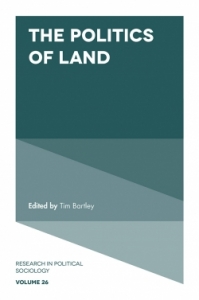In The Politics of Land, editor Tim Bartley brings together contributors to highlight the significance of the neglected issue of land to political sociology. This is a highly informative volume that explores a range of issues related to the land-politics nexus beyond the top-down understanding of its role in capitalist accumulation with much potential for future sociological research, writes Alexander Dobeson.
The Politics of Land. Tim Bartley (ed.). Emerald. 2019.
This important volume, edited by Tim Bartley, highlights the significance of the neglected issue of land – an empirical field usually ‘outsourced’ to rural sociology departments at agricultural universities and the bread-and-butter subject of human geographers – to political sociology. Evidence that the study of land does not merely represent a new niche, but is a central topic of mainstream sociology is provided by the sheer breadth of issues related to the land–politics nexus discussed in this volume, ranging from the role of the state and fiscal sociology through social movements to regulation and inequality. It is moreover refreshing to see both senior and early-career scholars and a diverse range of mixed methods, including historical, statistical and qualitative analysis, in the contributions. This underscores the resurgent interest in land and related issues, even though Barrington Moore (1966) and Jeffrey M. Paige (1975) put it at the centre of their seminal accounts decades ago.
Drawing on Karl Polanyi’s (2001) conceptualisation of land as a ‘fictitious commodity’ – a quasi-commodity that was not produced for the market in the first place – Bartley’s introduction sets out that the commodification of land is always a highly contested political process. Against this backdrop and supported by the empirical contributions to this volume, Bartley (4–5) therefore cautiously highlights that the appropriation of land and its transformation into commodity form is not merely a linear top-down process driven by powerful interest groups, as neo-Marxian scholars suggest (David Harvey, 1982), but is contingent on its embeddedness in existing institutional frameworks, the role of the state, local relations and societal ‘countermovements’ to its commodification (see also Bartley, 2018).
The volume’s first part, ‘Capacities’, revolves around the role of state and non-state actors in establishing control over land. In this light, the chapter by Simeon J. Newman sets out to challenge the neo-Weberian categorisation of the modern state as monopoliser of power by demonstrating how more or less strong efforts by the state to control squatter settlements in twentieth-century Lima, Peru, were undermined by neighbourhood elites seizing control over ‘their’ turf for the purpose of opportunistic rent-seeking. The limits of state power in the face of landed interests are furthermore supported by Isaac William Martin’s Polanyian account of land, which shows that property tax limitations hedge land owners from the volatility of market valuation in some US states, building the bedrock of a conservative countermovement that, ironically, leads to the exposure of weaker, landless groups to market forces. The question of why and how more progressive land reform movements were more successful with institutionalising land taxes in some states (and countries) than in others, however, remains an intriguing puzzle for future research.
Read full post on the LSE Review of Books blog.
Dr Alexander Dobeson is a researcher at the Department of Sociology at Uppsala University and currently a Visiting Fellow at LSE Sociology (a.dobeson@lse.ac.uk). His current research project investigates the socio-technical, institutional and cultural practices of land valuation.


 Find this book:
Find this book: 

